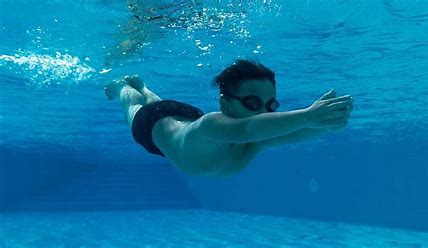Some of us head to the pool or ocean all year. Others are
fair weather swimmers. Whatever type you are, the water awaits. It’s time to
swim!

There’s something deeply re-energising about gliding through
the water, whether it’s chlorine or salt water.
You come out feeling relaxed and buzzing. Renewed. But you
can’t help wonder… was it a good use of your time? Would you have been better
off going for a run or doing an exercise class? And what about that thing your
friend says that swimming makes you put on weight?
Don’t worry! Swimming is an amazing form of exercise, and
wonderful for your physical and mental health. Here’s why:
1. It strengthens all your muscles
Swimming gives you a full-body workout. It works muscles
throughout your entire body, including your legs, glutes, arms, neck, shoulders
and core. Remember, water is 800 times denser than air, so it gives you a great
resistance workout.
2. It lowers stress and helps with depression
Ever got out of the pool and felt the weight of the world
had lifted off your shoulders? You didn’t imagine it. Swimming can induce a
relaxation response similar to yoga.
The relaxation response is thought to be due to the constant
stretching and releasing of your muscles, combined with deep rhythmic
breathing. Plus, the feeling of being away from everything in the water (where
your phone can’t beep at you) can help relieve stress.
3. It burns calories
Swimming can burn equal or greater calories than running,
although it depends on how hard and fast you go.
Running for 10 minutes burns around about 100 calories
(depending on your weight and speed).
With 10 minutes of swimming, you burn 60 calories with
breast stroke, 80 calories with backstroke, 100 calories with freestyle, and
150 with butterfly stroke.
4. It regulates blood sugar
A 2016 study found that short bursts of high-intensity
swimming three times a week can balance blood glucose. That’s great news for
those with diabetes or it you are at risk of diabetes.
5. It helps you live longer
No, really. Researchers at the University of South Carolina
looked at 40,547 men, aged 20 to 90, for over 32 years. They found those who
swam had a 50 per cent lower death rate than runners, walkers, or men who
didn’t exercise.
What about just submerging yourself in water? Is that good
too?

Yes. And there’s different benefits for cold vs warm water.
Immersing yourself in very cold water, that is around 15 degrees Celsius, can
help with pain, muscle recovery and boosts your metabolism. Some studies
suggest it can reduce symptoms of depression.
Ice baths take this idea up a notch. The “Wim Hof method”
promotes ice baths or very cold showers combined with deep breathing. Wim Hof
says it stimulates your vague nerve, which boosts your parasympathetic nervous
system and affects conditions such as anxiety and depression.
Lowering yourself into warm water is a gentler way to
promote relaxation. Research from Washington State University finds that warm
water immersion, like a bath, balances your nervous system and helps lower
stress.
“The effects of aquatic immersion are profound, and impact
virtually every body system,” says Dr Bruce Becker, director of the National
Aquatic & Sports Medicine Institute at Washington State University.